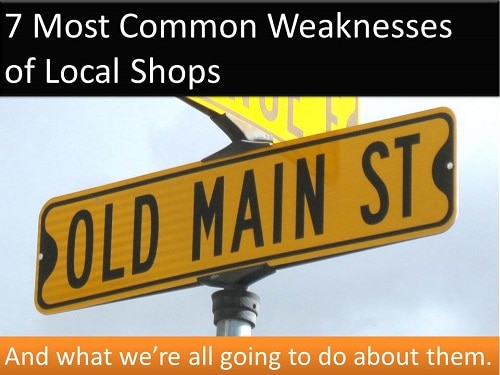The 7 Most Common Weaknesses of Local Shops
And what we’re all going to do about them.
As we head into the busy holiday shopping season, we’ll see lots of Shop Local messages working to get customers to think about shifting their shopping more to local stores. I want to add another layer, and get rural business owners to think about making Better Local Shopping to hold on to those customers.
This is part of a seven week series on the weaknesses and what we can do about them.
If you’re a local business, you can take these to heart. Make an honest effort to improve in each of these areas over the next 7 weeks. That takes us up to Thanksgiving holiday in the US, Shop Small Saturday, and the final few weeks of holiday shopping everywhere.
If you’re with a Chamber of Commerce or other business organization, you can gather a small group of merchants who want to work on these together. Meet, go over the weakness, brainstorm some ideas, and maybe find ways to share resources and turn them into strengths.
The Series:
- Weakness 1: Limited Business Hours
- Weakness 2. Poor Customer Service
- Weakness 3. Limited Selection
- Weakness 4: High Prices
- Weakness 5: Dated Appearance or Ugly Buildings
- Weakness 6. Not Marketing
- Weakness 7. Failing the Showrooming Test

Pricing isn’t simple. But you don’t have to be a genius to stay competitive.
Weakness 4. High Prices
Solution: Learn how you compare to other retailers.
It’s a bit of a stereotype that everything costs more in small town stores and less at those big boxes. It’s not always true. (Need some studies to that effect? Start with these.)
Retail stores in the US can use publicly-available retail markup benchmarks. The Retail Owners Institute offers industry benchmark data in a section called Store Benchmarks. They break down industry averages into 51 different retail lines. They give five years of data for Gross Margin Percentage. This is a great start to compare the markups for any retail store. Read this article for more help with markups and benchmarks.
You don’t have to match the price of every national retailer, because you have the advantage of better service and local importance. But don’t every let that be an excuse to be too high on price.
Bob Phibbs, The Retail Doctor, said, “The reality is you’re going to have to do a better job of displaying and selling it to justify selling it at that higher price. If you do these things, you’ll gain loyal customers who are willing to pay a little more for your product because they appreciate the extra effort you’ve put forth to get it into their hands.”
New to SmallBizSurvival.com? Take the Guided Tour. Like what you see? Get our updates.
- About the Author
- Latest by this Author
Becky started Small Biz Survival in 2006 to share rural business and community building stories and ideas with other small town business people. She and her husband have a small cattle ranch and are lifelong entrepreneurs. Becky is an international speaker on small business and rural topics.












Ah, the race to the bottom…
Ultimately, businesses should to charge what they *need to* in order to cover costs of goods and overhead to stay open. Seems simple, right?
Long ago, we decided we would not compete on pricing, even on items that are available at big box markets and online. Frankly, we can’t. We have no where near the massive sales volume of other, similar businesses.
Instead, we focused on creating an absolutely unique and inviting small business experience that overrides a customer’s typical notions about shopping solely on price. I strongly believe informed customers will spend a little extra for a friendly experience, great service, and the knowledge that their purchase is strengthening the social-economic fabric of their community.
Here we are, five years later, and I am convinced that approach is correct.
This is another important topic – I hope we’ll hear from other biz owners on their pricing approach!
Brian, yeah, it’s simple, just like that simple formula for pricing on the blackboard. And your five years of success is a pretty good indication that you’re in the right place for your market.
This is an important topic, and one of the main reasons our local people shop out of town. The economy here has gotten quite depressed and good customer service just doesn’t make up for the higher prices. I would like to see rural merchants have the opportunity to buy wholesale more competitively, by perhaps co-operative purchasing with other nearby small town merchants, or through some sort of “small business co-op”. Also it would be nice if some manufacturers would work with rural merchants by offering more competitive pricing to merchants that meet certain criteria, ie: retailers in towns below a certain population or that are more than a certain distance from a larger town. Not likely to happen, but it would be nice.
Lila, you make a good case for matching to your market. Your town is different than Brian’s town, is different from my town.
And I’d LOVE to see more cooperation with suppliers and wholesalers and local retailers.